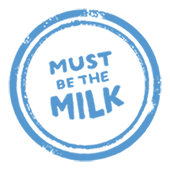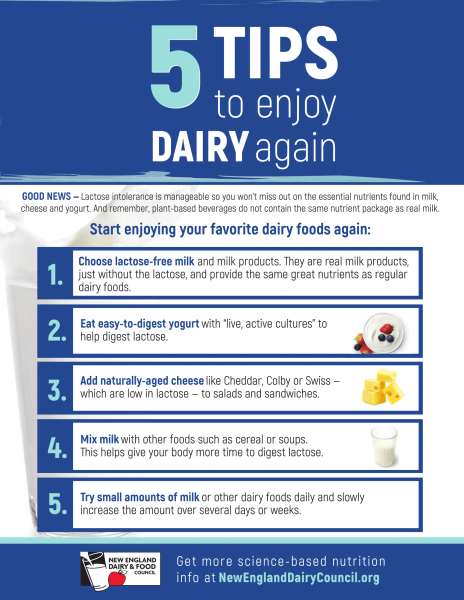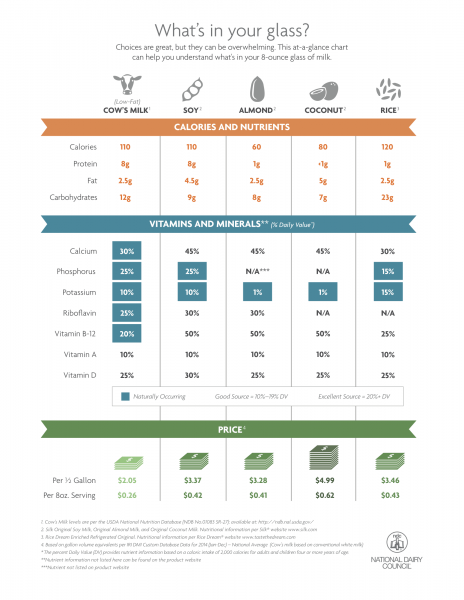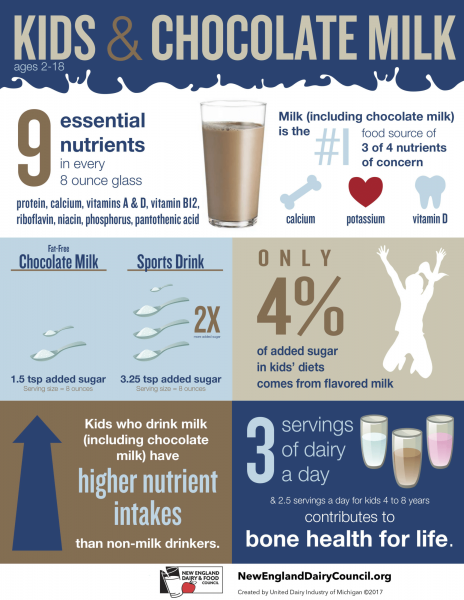We’re so glad you came!
There are several stories about our New England dairy farms we’d like to share, like how farmers are using tech in amazing ways to care for cows and the environment.
Get your questions answered below!
Is Cow Manure Bad For The Environment?
 A dairy cow produces as much as 120 pounds of manure a day. However, farmers recognize that manure is a valuable resource to be recycled instead of wasted. Manure contains important nutrients for growing plants, such as nitrogen and phosphorus. Applying manure to farm fields reduces or eliminates the need to add these nutrients via chemical fertilizers. Anaerobic digester systems allow farmers to go a step further and recycle manure into biofuel or clean, renewable electricity. In America, the dairy industry is responsible for only about 2 percent of total greenhouse gas emissions. U.S. milk production has the lowest carbon footprint per gallon compared to all other countries.
A dairy cow produces as much as 120 pounds of manure a day. However, farmers recognize that manure is a valuable resource to be recycled instead of wasted. Manure contains important nutrients for growing plants, such as nitrogen and phosphorus. Applying manure to farm fields reduces or eliminates the need to add these nutrients via chemical fertilizers. Anaerobic digester systems allow farmers to go a step further and recycle manure into biofuel or clean, renewable electricity. In America, the dairy industry is responsible for only about 2 percent of total greenhouse gas emissions. U.S. milk production has the lowest carbon footprint per gallon compared to all other countries.
Other Resources:
Cow Poop Infographic
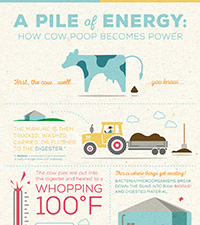 Anaerobic digester systems recycle manure into clean, renewable electricity to power the farm. Surplus electricity is available to power nearby homes and businesses. There are now over 250 anaerobic digesters across the country, including 22 in New England. See how it works!
Anaerobic digester systems recycle manure into clean, renewable electricity to power the farm. Surplus electricity is available to power nearby homes and businesses. There are now over 250 anaerobic digesters across the country, including 22 in New England. See how it works!
How Are Dairy Farmers Protecting Our Water And Soil?
 Healthy soil is essential for nutritious food and clean water. Farmers are adopting soil-building practices, such as covering their fields with plants all year long, and many use apps on their smart phones to precisely track the amount of nitrogen that is applied to their fields in manure or fertilizer. That way, they only use exactly what the plants can use, ensuring these nutrients stay in the ground.
Healthy soil is essential for nutritious food and clean water. Farmers are adopting soil-building practices, such as covering their fields with plants all year long, and many use apps on their smart phones to precisely track the amount of nitrogen that is applied to their fields in manure or fertilizer. That way, they only use exactly what the plants can use, ensuring these nutrients stay in the ground.
Other Resources:
How Do Dairy Farmers Treat Their Animals?
 Healthy and happy cows make high quality, nutritious milk. Dairy farmers use new technologies to keep their ladies comfy. Did you know that cows have back scratchers set up for them in the barn? At many farms, cows can create their own milking schedule thanks to robotic milking machines. This has shown to increase their happiness and milk production. Check out how farm technology is improving the lives of dairy cows.
Healthy and happy cows make high quality, nutritious milk. Dairy farmers use new technologies to keep their ladies comfy. Did you know that cows have back scratchers set up for them in the barn? At many farms, cows can create their own milking schedule thanks to robotic milking machines. This has shown to increase their happiness and milk production. Check out how farm technology is improving the lives of dairy cows.
Other Resources:
- A day in the life of a dairy cow – Did you know dairy cows spend 12 – 14 hours a day asleep or lounging? Check out the day in the life of a dairy cow.
Are Dairy Foods GMO?
 Milk is not genetically modified. Dairy cows may be fed genetically modified crops such as corn; however, there is no evidence to suggest negative health or productivity effects in animals fed these crops. The plants are digested by the cow, and the resulting dairy products do not contain GMOs. If a dairy product contains other ingredients, you can check to see if those are bioengineered. Under organic farming guidelines, organic dairy farms are not allowed to feed their cows genetically modified crops.
Milk is not genetically modified. Dairy cows may be fed genetically modified crops such as corn; however, there is no evidence to suggest negative health or productivity effects in animals fed these crops. The plants are digested by the cow, and the resulting dairy products do not contain GMOs. If a dairy product contains other ingredients, you can check to see if those are bioengineered. Under organic farming guidelines, organic dairy farms are not allowed to feed their cows genetically modified crops.
Other Resources:
- GMO one-page PDF – There is lots of uncertainty and questions surrounding GMOs. Here are some answers, resources, and food for thought.
 Healthy and happy cows make high quality, nutritious milk.
Healthy and happy cows make high quality, nutritious milk.
Dairy farmers use new technologies to keep their ladies comfy. Did you know that cows have back scratchers set up for them in the barn? At many farms, cows can create their own milking schedule thanks to robotic milking machines. This has shown to increase their happiness and milk production. Check out how farm technology is improving the lives of dairy cows.
Other Resources:
- A day in the life of a dairy cow – Did you know dairy cows spend 12 – 14 hours a day asleep or lounging? Check out the day in the life of a dairy cow.
 No. The size of a farm does not affect the well-being of cows.
No. The size of a farm does not affect the well-being of cows.
Dairy farms – whether large or small – make animal care a top priority. Farmers care for their cows by providing a nutritious diet, good medical care and healthy living conditions because they depend on the animals for their own livelihood. It’s typical for farmers to spend the majority of their operating costs on the care of their cows.
Research shows that cows need to be calm, happy, comfortable and well fed to make high quality milk. Cow comfort includes soft bedding like water beds, misting cows in the summer to keep them cool, new options for feeding so that cows are well-fed, and reducing noise to keep cows calm including playing music in barns.
![]() Milk is truly a local food and remains so, even as food supply chains have become longer and more complicated.
Milk is truly a local food and remains so, even as food supply chains have become longer and more complicated.
The vast majority of the milk in New York and New England supermarkets is produced in the region by our dairy farmer neighbors. Over 99 percent of the milk produced on New England dairy farms is bottled or processed into cheese, butter, ice cream, and yogurt in New England or New York.
Whether you get your milk from a farm that has a farm store or still offers home delivery in your area or from the grocery store, when you buy real cow’s milk, you are supporting a local farmer.
How can I tell if the gallon of milk I purchased at the supermarket was produced in New England or my state?
Each container of milk is identified by a 5-digit code. The code includes a 2-digit state code followed by a 3-digit processing plant code. Visit www.whereismymilkfrom.com and enter your code. The same goes for your yogurt, chocolate milk, coffee creamer, cottage cheese, ice cream and more.
In New England and New York, the dairy industry has laid the groundwork for today’s growing local food movement. Generations of dairy farmers have supported local agriculture businesses and organizations like farm equipment dealers, banks, land trusts, and veterinary practices. It is these businesses and organizations that provide the foundation of support for the farm stands and CSAs that provide fresh and delicious fruits, vegetables, eggs, meat, and dairy products to a growing number of communities.
![]() New England and New York dairy farms are the nucleus of the region’s agriculture economy managing over 50 percent of the cropland in five of New England’s six states, 5,000 farms and 2.5 million acres of land in New York, and stewarding thousands of acres of woodlands, wetlands, and pasture.
New England and New York dairy farms are the nucleus of the region’s agriculture economy managing over 50 percent of the cropland in five of New England’s six states, 5,000 farms and 2.5 million acres of land in New York, and stewarding thousands of acres of woodlands, wetlands, and pasture.
Learn more about the economic impact dairy has in your state:
![]() Wrong. Increases in milk production per cow allow farmers to be more efficient with the resources of land, water, fossil fuels and fertilizers thereby promoting environmental stewardship.
Wrong. Increases in milk production per cow allow farmers to be more efficient with the resources of land, water, fossil fuels and fertilizers thereby promoting environmental stewardship.
In recent decades improvements in animal breeding, animal health programs, cow comfort and farm management practices have allowed dairy cows today to make more milk from the same quantity of resources (or the same amount of milk with fewer resources). This reduces the demand for non-renewable or energy-intensive inputs (e.g. land, water, fossil fuels and fertilizers) and promotes environmental stewardship. It’s estimated that the carbon footprint of milk has been reduced by 63% since 1944, according to Cornell research.
Additionally, dairy is not easily replaced in the diet as a source of essential nutrients. Recent research by the Proceedings of the National Academy of Sciences found that removing animals from U.S. agriculture would result in a 2.6% reduction in greenhouse gas emissions, but would also create a food supply incapable of supporting the U.S. population’s nutritional requirements.
 A dairy cow can produce more than 100 pounds of manure a day. However, farmers recognize that manure is a valuable resource to be recycled instead of wasted.
A dairy cow can produce more than 100 pounds of manure a day. However, farmers recognize that manure is a valuable resource to be recycled instead of wasted.
Manure contains important nutrients for growing plants, such as nitrogen and phosphorus. Applying manure to farm fields reduces or eliminates the need to add these nutrients via chemical fertilizers. Anaerobic digester systems allow farmers to go a step further and recycle manure into biofuel or clean, renewable electricity. In America, the dairy industry is responsible for only about 2 percent of total greenhouse gas emissions. U.S. milk production has the lowest carbon footprint per gallon compared to all other countries.
Other Resources:
Cow Poop Infographic
 Anaerobic digester systems recycle manure into clean, renewable electricity to power the farm. Surplus electricity is available to power nearby homes and businesses. There are now over 250 anaerobic digesters across the country, including 22 in New England. See how it works!
Anaerobic digester systems recycle manure into clean, renewable electricity to power the farm. Surplus electricity is available to power nearby homes and businesses. There are now over 250 anaerobic digesters across the country, including 22 in New England. See how it works!
 Healthy soil is essential for nutritious food and clean water.
Healthy soil is essential for nutritious food and clean water.
Farmers are adopting soil-building practices, such as covering their fields with plants all year long, and many use apps on their smart phones to precisely track the amount of nitrogen that is applied to their fields in manure or fertilizer. That way, they only use exactly what the plants can use, ensuring these nutrients stay in the ground.
Other Resources:
![]() No. The most recent report by the U.S. Food and Drug Administration (FDA) affirms that there are NO antibiotics found in milk heading to retail.
No. The most recent report by the U.S. Food and Drug Administration (FDA) affirms that there are NO antibiotics found in milk heading to retail.
Currently, the FDA requires that all milk – organic and conventional – be tested for commonly used antibiotics when it arrives at the milk plant. Any milk that tests positive is rejected and cannot be sold to the public. The farmer responsible for the contaminated milk is fined and could lose his or her license to sell milk.
In March 2015, the FDA released the results of an extensive survey that confirmed that the checks and balances of America’s milk safety system are effective at preventing drug residues from reaching consumers.
 No. Farmers work with their veterinarians to provide medicines to cows when they are sick – just like you may work with your doctor to provide medicines to treat you and your family when ill.
No. Farmers work with their veterinarians to provide medicines to cows when they are sick – just like you may work with your doctor to provide medicines to treat you and your family when ill.
Banning or severely restricting the use of antibiotics in animals can negatively impact a veterinarian’s ability to protect animal health and prevent animal suffering, which can lead to poor animal welfare and poor-quality milk.
![]() Both are equally nutritious. There is no scientific evidence concluding that organic dairy products are safer or healthier than regular dairy products.
Both are equally nutritious. There is no scientific evidence concluding that organic dairy products are safer or healthier than regular dairy products.
Organic milk and regular milk both contain the same amount of nine essential nutrients – such as calcium, vitamin D and potassium – that make dairy an important part of a healthy diet. According to USDA and the American Dietetic Association, conventionally produced food is equally as safe and nutritious as organically produced food. Organic milk is just one of many options in the dairy case to fit different lifestyles and personal preferences.
![]() The term organic simply refers to on-farm practices. All milk produced in the US must adhere to the same strict federal standards for quality, purity and sanitation.
The term organic simply refers to on-farm practices. All milk produced in the US must adhere to the same strict federal standards for quality, purity and sanitation.
Those using the “USDA organic” seal must ensure that the milk comes from dairy farms that meet the following criteria:
- Cows spend at least 120 days per year on green pasture. They usually eat supplemental feed as well, to make sure they get enough protein.
- In the winter, cows on organic dairy farms eat the same type of feed as cows on other farms, except the ingredients must be certified organic and grown without the use of pesticides, commercial fertilizers, or genetically modified seeds.
- Organic farmers are still able to use pesticides – but they are approved for organic use.
- Cows are not treated with supplemental hormones.
- Cows have not been given antibiotics to treat illness. If a cow at an organic dairy farm does have to be treated with antibiotics, the farmer can no longer use her milk, even after she is no longer taking antibiotics.
Many regular dairy farms use these same management practices but choose not to undergo the rigorous organic certification process. For example – the majority of farms in New England are prohibited from using supplemental hormones to increase milk production.
![]() YES! A tall glass of milk provides a unique combination of nine essential nutrients including calcium, protein, and vitamin D that play a key role in keeping our hearts ticking and our bones and muscles strong and healthy. The 2015-2020 Dietary Guidelines for Americans and dietary experts recommend three servings of milk, cheese, or yogurt each day.
YES! A tall glass of milk provides a unique combination of nine essential nutrients including calcium, protein, and vitamin D that play a key role in keeping our hearts ticking and our bones and muscles strong and healthy. The 2015-2020 Dietary Guidelines for Americans and dietary experts recommend three servings of milk, cheese, or yogurt each day.
How dairy impacts your health:
- Three servings of dairy every day can help keep bones healthy now and reduce your risk of osteoporosis later in life.
- Calcium does double duty! Potassium, magnesium, and calcium, all found in dairy foods, may be key ingredients in maintaining a healthy blood pressure.
- Milk has just the right mix of carbohydrates, protein, and electrolytes to help refuel, build muscle, and re-hydrate your body after a workout. Dairy is an important part of a fit and healthy lifestyle and a nutrient-rich balanced diet. Reduced-fat, low-fat, and fat-free dairy foods can help people get the nutrients they need, while managing their calories and weight in a healthy way.
- Lactose intolerant? The good news is you don’t have to give up your favorite dairy foods! Lactose-free milk, aged cheeses, which are naturally lower in lactose, and yogurt can help you get the nutrients you need without the discomfort.
- Did you know by the age of 20, 85 to 90 percent of adult bone mass is already formed? Even more reason to make sure your kids are enjoying three servings of dairy a day (and yes, chocolate milk counts too) to form healthy habits and build the strongest and healthiest bones possible.
 Milk is not genetically modified. Dairy cows may be fed genetically modified crops such as corn; however, there is no evidence to suggest negative health or productivity effects in animals fed these crops.
Milk is not genetically modified. Dairy cows may be fed genetically modified crops such as corn; however, there is no evidence to suggest negative health or productivity effects in animals fed these crops.
The plants are digested by the cow, and the resulting dairy products do not contain GMOs. If a dairy product contains other ingredients, you can check to see if those are bioengineered. Under organic farming guidelines, organic dairy farms are not allowed to feed their cows genetically modified crops.
Other Resources:
- GMO one-pager PDF – There is lots of uncertainty and questions surrounding GMOs. Here are some answers, resources, and food for thought.
![]() Consuming unpasteurized or “raw” milk presents severe food safety risks, which is why the U.S. Centers for Disease Control (CDC) and Prevention and the U.S. Food and Drug Administration (FDA) recommend that no one consume unpasteurized milk.
Consuming unpasteurized or “raw” milk presents severe food safety risks, which is why the U.S. Centers for Disease Control (CDC) and Prevention and the U.S. Food and Drug Administration (FDA) recommend that no one consume unpasteurized milk.
Pasteurization is a simple, effective method to kill harmful pathogens, such as E. coli and salmonella. It does not affect the nutritional value of milk in any meaningful way.
Milk and milk products provide a wealth of nutrition benefits. But unpasteurized or raw milk can harbor dangerous microorganisms that can pose serious health risks to you and your family including tuberculosis, listeria and salmonella.
![]() Nope! Those who are lactose intolerant don’t have to miss out on the great taste and health benefits of dairy.
Nope! Those who are lactose intolerant don’t have to miss out on the great taste and health benefits of dairy.
Different people can handle different amounts of lactose, and there’s a solution to meet most needs in the dairy case – from lactose-free milk to dairy foods that are typically easier to digest, like hard cheeses and yogurt.
Other Resources:
 No. Farm fresh, real dairy milk is naturally nutrient rich — which is difficult to match in most non-dairy milk alternatives, and backed by decades of research.
No. Farm fresh, real dairy milk is naturally nutrient rich — which is difficult to match in most non-dairy milk alternatives, and backed by decades of research.
Dairy milk has only three ingredients – cow’s milk, vitamin A and vitamin D, which is far fewer than non-dairy, almond, soy, or rice milks, which often contain as many as 15 ingredients, including stabilizers, syrups, added sugar, salt and thickeners. Non-dairy milk alternatives vary in their nutritional profiles and are often fortified, and their nutritional impact has not been thoroughly studied, so it’s important for people to understand there are key differences between the beverages.
Nutritionally, almond milk has about 1 gram of protein per 8 oz. serving compared to 8 grams in an 8 oz. serving of milk. Soy beverages contain a different set of nutrients than cow’s milk. Although the protein and fat content are similar, soy beverages are naturally low in calcium, containing only about 10 mg per serving. Manufacturers often fortify with calcium, but the amount added is not regulated and can vary from 80 to 500 mg per serving. The other nutrients in milk important for bone health—including vitamin D, phosphorus, potassium and magnesium—are also not present at the same levels in soy beverages.
Dairy is local, wholesome and fresh. It can connect you and your family to what real food is all about – when you buy dairy you are also supporting New England dairy farmers near you.
Learn more about how non-dairy alternatives compare to cow’s milk.
Other Resources:
- What’s in your glass one-pager PDF
![]() No. Kids who drink milk (including chocolate milk) have higher nutrient intakes than non-milk drinkers, and are just as likely to be at a healthy weight as kids who do not drink chocolate milk.
No. Kids who drink milk (including chocolate milk) have higher nutrient intakes than non-milk drinkers, and are just as likely to be at a healthy weight as kids who do not drink chocolate milk.
Like white milk, chocolate milk has the same 9 essential nutrients important for kids’ growth, development, and physical activity. Chocolate milk is a great alternative to replacing sugary drinks like soda and fruit beverages in kids’ diets, while not obtaining higher intakes of sugar and fat. For example, fat-free chocolate milk has 1.5 tsp of added sugar per 8 oz. serving, and sports drinks have twice that amount with 3.25 tsp. of added sugar in an 8 oz. serving.
The benefits of milk, including chocolate are long lasting – 2.5 servings of dairy a day for kids 4 to 8 years old contributes to bone health for life.
Other Resources:
